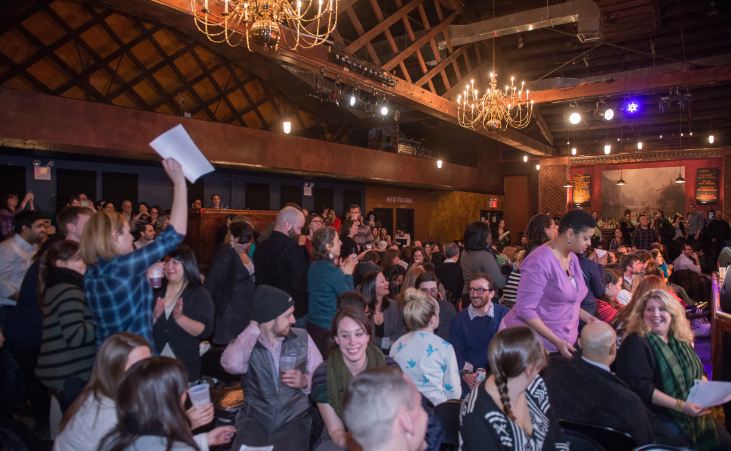Trivia for Corporate vs. Public Audiences – What’s the Difference?
 Trivia for Corporate NYC
Trivia for Corporate NYC
This month marks my 15th year working in the events industry, and my 9th as a professional trivia host in New York City. I’ve had the unbelievable privilege of having produced nearly 800 public and private trivia events in that time, first as a bar trivia night quizmaster in Manhattan, then forming TrivWorks to provide employee team building activities and corporate event entertainment. Since 2011, I have also had the honor of producing NYC’s biggest trivia nights (300 attendees) several times a year at The Bell House in Gowanus, Brooklyn.
When people find out about this unique job of mine, they often ask what’s the difference between producing a public and private event. Ultimately, the goal is always the same: to create an extremely fun, high-energy and social shared competitive experience. However, there are definitely some distinct differences between the two as far as production, as well as audience expectation.
With corporate trivia parties, I’m seeking to make the experience and memorable and impactful as possible for the participants, depending on the expressed goals of the event. Very often a primary objective is to get participants to know one another better; often it is to break down barriers between departments, or perhaps integrate new team members. For retreats, annual meetings and brand engagement/experiential marketing events, often there are some key messages we want to reinforce as well. As such, customizing the trivia for both the specific attendees and goals of the event is crucial for corporate audiences, and we do it in a variety of ways – ideally, asking questions which only the specific group in attendance would know the answer to, such as past shared experiences, inside jokes, fun facts about colleagues and the business itself, etc.
With public trivia nights, NYC or elsewhere, the process is a little different. In the case of our Bell House events, we’ve got 300 strangers in the room with no connection whatsoever, save for their love of the theme, the host, or trivia itself. How, then, can we tailor the experience for them?
As with private events, we want everybody who attends a public event to feel like they are participating, and that the questions are appropriate for them. As such, we put ourselves in the heads of those who are in the audience: what would somebody who is committing to come to this event reasonably be expected to know/be interested in? If it’s a 90s trivia-themed event hosted by NY1 anchor Pat Kiernan, I know that the audience will most likely be in their 20s/30s, be news and pop culture savvy, and appreciate a certain degree of wit/edginess to the questions. If it’s a science-themed event like the Science Friday gig we produced this past spring, the audience will again likely be young and fun-loving, but also clearly into a wide range of hard science questions.
Whether the event is for a company or for the ticket-buying public, it’s also generally a good idea to keep the round themes and questions themselves broad. Pat Kiernan and I are big believers in using pop culture trivia as much as possible, since it’s a great way to connect folks who otherwise don’t have much in common; you may have a diverse group who are young, old, have worked together for years or only just met, but they do have shared knowledge of TV, movies, music, celebrity news and more.
Visit https://trivworks.com/corporate-entertainment/ to learn more.